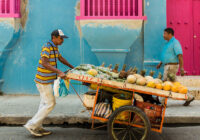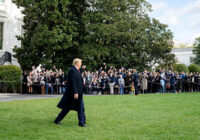Whoever becomes Colombia’s next president will face significant challenges, including the monumental job of guiding a divided population into a new era of peace.
Colombia’s presidential elections, set to take place in the summer of 2018, the country’s first since the signing of the 2016 peace agreement in Havana, will be a test of Colombians’ acceptance of both the peace process and of the former Revolutionary Armed Forces of Colombia (FARC) guerrilla group’s transition into politics. Although the Colombian people have longed for an era of peace, the process that finally ended five decades of conflict significantly polarized the country, both socially and politically.
On January 29, President Juan Manuel Santos suspended peace talks with the left-wing National Liberation Army rebels following recent bombings that left seven policemen dead and injured 47 civilians. If Colombia wishes to maintain social and political stability, the next president will have to tread carefully between a passionate electoral base opposed to the peace agreement and a population that seeks healing through reconciliation.
The 2018 elections will be the first to include the newly baptized Common Alternative Revolutionary Force, formed from the demobilized FARC. Former FARC commander Rodrigo Londoño’s candidacy for president will also be the first time in over 50 years that Colombians will engage with FARC actors in a political, rather than insurgent, capacity.
Colombians have mixed feelings about the peace agreement negotiated by President Santos, and they initially rejected the Havana accord in a popular referendum in 2016. This was as much a testament to how out of touch Santos is with the Colombian public as to popular concerns with the peace agreement itself. As a result, there is little public support for candidates who actively favor the Havana agreement, now so closely associated with the unpopular Santos. Unsurprisingly, no candidate wants the peacemaker’s endorsement.
While a number of Colombians view the Havana accord as much needed closure of a tragic and violent chapter in the country’s history, many still retain a profound disdain for, and suspicion of, former FARC members, even with the group’s transition into democratic politics. President Santos’ political opposition has successfully exploited this social tension by playing up the public’s fear that the country will be taken over by Fidel Castro’s brand of communism now that former Marxist guerrillas have entered the political arena. Just a handful of FARC party representatives in the national congress, key right-wing political figures argue, could lead the country down a path similar to Venezuela’s.
This dynamic has paved the way for former Vice President Germán Vargas Lleras to emerge as the strongest presidential candidate. Running as an independent, Vargas Lleras is seen as an opposition figure who will stand up to the specter of communism that is menacing Colombia. This is a serious challenge for former president and Democratic Center Party head Alvaro Uribe, who led the successful “No” campaign against the Havana agreement. After months of anticipation, Uribe and the Democratic Center finally announced on December 10, 2017, that Senator Ivan Duque would be the party’s presidential candidate. However, despite the strength of Uribe’s endorsement, Duque is widely regarded as too young, and the party’s base views him as soft on many key issues.
This leaves the field wide open for Vargas Lleras, who will likely become the default candidate for Colombia’s wide center-right base and attract the support of Uribe’s constituents during the second round of presidential voting. With the remaining center-left and left-wing parties too numerous, divided and unpopular, it is difficult to see Vargas Lleras facing a serious left-wing challenger.
Whoever becomes Colombia’s next president will face significant challenges, including the monumental job of guiding a divided population into a new era of peace. In many ways, Vargas Lleras is not the president Colombia needs, but he seems to be the president most Colombians want: a straight-talker, grandson of a former president and, most importantly, highly critical of the FARC.
But the risk of Vargas Lleras’ no-nonsense approach is that the country’s social and political polarization will become so entrenched, former FARC guerillas will be pushed out of mainstream politics and back into the jungle, restarting another cycle of violence. To avoid this, Colombia — both the political elite and the general population — must accept and formalize political space for these former guerrilla soldiers. Whether they do so will decide the future of the country’s fragile peace.
*[Young Professionals in Foreign Policy is a partner institution of Fair Observer.]
The views expressed in this article are the author’s own and do not necessarily reflect Fair Observer’s editorial policy.
Photo Credit: Ilyshev Dmitry / Shutterstock.com
Support Fair Observer
We rely on your support for our independence, diversity and quality.
For more than 10 years, Fair Observer has been free, fair and independent. No billionaire owns us, no advertisers control us. We are a reader-supported nonprofit. Unlike many other publications, we keep our content free for readers regardless of where they live or whether they can afford to pay. We have no paywalls and no ads.
In the post-truth era of fake news, echo chambers and filter bubbles, we publish a plurality of perspectives from around the world. Anyone can publish with us, but everyone goes through a rigorous editorial process. So, you get fact-checked, well-reasoned content instead of noise.
We publish 2,500+ voices from 90+ countries. We also conduct education and training programs
on subjects ranging from digital media and journalism to writing and critical thinking. This
doesn’t come cheap. Servers, editors, trainers and web developers cost
money.
Please consider supporting us on a regular basis as a recurring donor or a
sustaining member.
Will you support FO’s journalism?
We rely on your support for our independence, diversity and quality.







